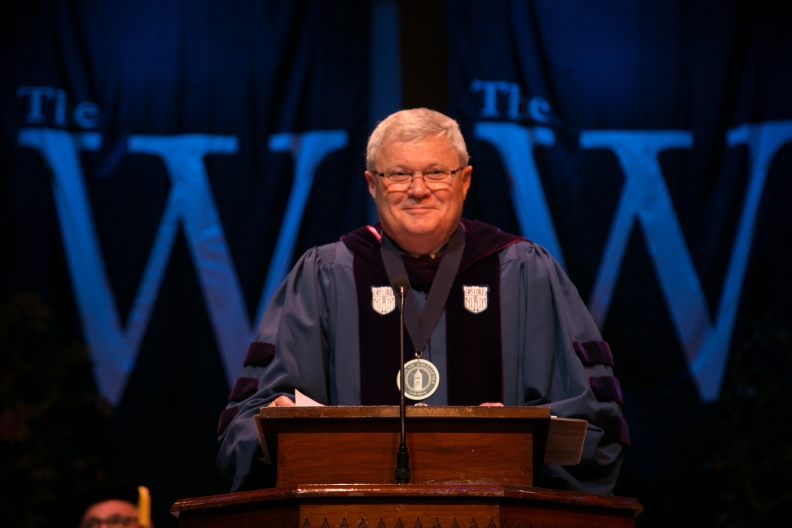COLUMBUS, Miss. – In a world that is rapidly changing and full of challenges, Dr. Thomas Richardson, provost and vice president for academic affairs at Mississippi University for Women, asked graduates to share their hearts and minds.
Early in his speech, Dr. Richardson congratulated the graduates, noting they have been able to achieve what two-thirds of U.S. adults have not been able to do.
“Many of you—as I am—are first-generation college students, so the path to a degree was largely an unfamiliar one when you began your journey,” he said. “Many of you have had to juggle multiple obligations outside of school, most notably families and jobs; 80 percent of you worked while you were students, and 40 percent of you worked full time.”
Richardson, whose distinguished career has spanned more than 30 years, acknowledged his academic discipline in English and used a few minutes to reflect on some “enduring lessons” from two novels in the history of British literature. The first was “The Heart of Mid-Lothian” by Sir Walter Scott and the second was “Frankenstein” by Mary Shelley.
In “The Heart of Mid-Lothian,” Scott wrote, “The times have changed in nothing more…than in the rapid conveyance of intelligence and communication betwixt one part of Scotland and another.” This opening, Richardson explained, was one of his favorite first sentences of a novel.
“In 1818 that `rapid conveyance of communication’ takes place by stage coach, and Scott’s narrator is referring to the improvements in delivering both passengers and the mail,” stated Richardson. The narrator goes: “It is not above twenty or thirty years…since a miserable little horse-cart, performing with difficulty a journey of thirty miles per diem, carried our mails from the capital of Scotland to its extremity…[now] mail-coach races against mail-coach, and high flyer against high-flyer, through the most remote districts of Britain.”
Richardson pointed out that Scott’s opening was a “profound understatement,” which could have been written in 2018. “Imagine what you would put in place of stage coaches for delivering information and people: The times have changed in nothing more than in the invention of the railroad, or the automobile, or air travel, or space travel, or the radio or television, or satellites, or the computer, or the Internet, or the cell phone, or Facebook, Instagram and Twitter.”
Richardson further explained that Scott’s novel is less about changes in modes of transportation and communication and more about a world that is transforming itself and what that means for the people living in it.
“How do people cope and adapt? What does social change mean for individual and community identities and human interaction,” Richardson asked.
A different approach to the “times have changed” theme is taken in Shelley’s “Frankenstein,” Richardson stated, noting that it points to a student’s post-graduation responsibilities.
“There are two ideas I would like to focus on from this brilliant novel. First of all, I want us to think about how Shelley addresses one of the significant questions in British literature, dating back to `Beowulf’ and the earliest British texts: that is, what is the difference between a human being and monster?”
Richardson explained that people still struggle with accepting others differences.
“Our ‘rapid conveyance of communication’ in our public discourse many times carries with it hateful and ignorant stereotypes, and our social media become another tool for bullying people who are different.
“We must remember that each of us is ‘different’ to someone also, and we need to think about how we want to be treated when we find ourselves in the company of people unlike us,” he said.
Richardson also touched on the importance of intellectual honesty, recognizing the fact that the scientist Victor Frankenstein abandoned his responsibility to his creation, as well as his scholarship and work.
“As students and faculty, we engage in study that will increase our knowledge and understanding of all aspects of human existence and that will enable us to understand and improve the human condition.
“Intellectual honesty is about engaging in civil discourse about ideas and issues that defy easy understanding. It is about letting go of our preconceptions and opening our minds to discover what lies along the paths of our intellectual investigations. We must be willing to listen to the ideas of others as we would have others to listen to us.”
Lastly, Richardson told graduates that they would face plenty challenges in a rapidly-changing world and there would be an abundance of issues for them to resolve.
“As you accept the honor that comes to you today, please accept as well the responsibility for a lifetime of learning, thought, insight, analysis, intellectual discussion, creativity, vision—and leadership,” he said. “Be willing to share your minds and your hearts with a world that cries out for rational, humane and creative leadership.”
FOR IMMEDIATE RELEASE
May 5, 2018
Contact: Anika Mitchell Perkins
(662) 329-7124
This email address is being protected from spambots. You need JavaScript enabled to view it.

